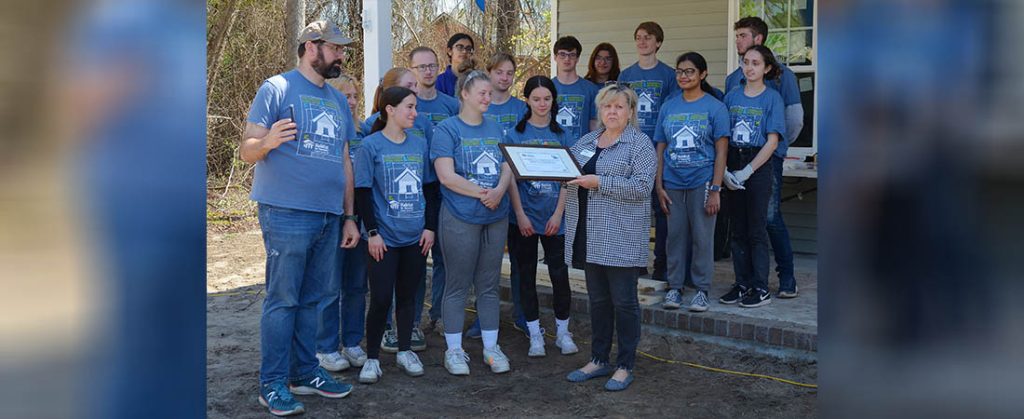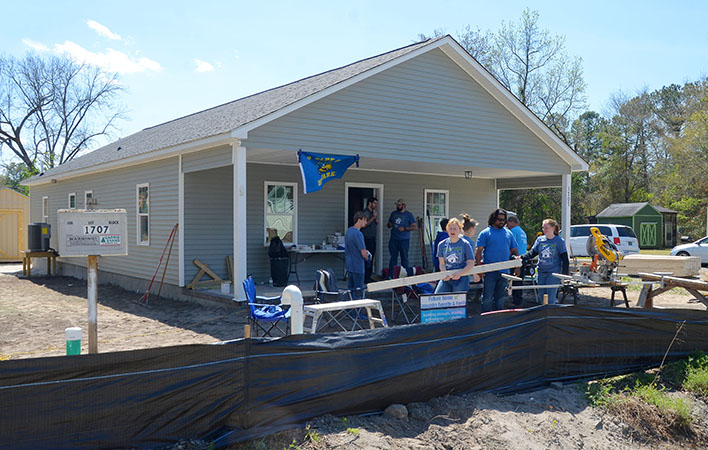
Habitat for Humanity of Craven County celebrated its decade-long partnership with the University of Delaware this week with a group of student volunteers working on a new Habitat project in the Pembroke community.
For the last 10 years, students from the school have taken time away from their spring break to help build homes with Habitat throughout Craven County as part of the Collegiate Challenge Alternative Spring Break Program. This year, 18 students from the school joined Habitat workers to help put the finishing touches on a new home going up on Aycock Avenue.
During a recognition ceremony at the construction site on March 30, Rose MacNeal, Habitat’s board president and chair, presented the students with a certificate in recognition of the school’s essential role in building Habitat homes over the last decade.
Michael Piraino, Habitat’s community outreach and development coordinator, also presented the students with a symbolic sledgehammer and saw blade.
MacNeal said the school’s participation over that time equals more than $110,000, which is typically the cost of a new Habitat home.
“That’s the amount of volunteer hours the students and leaders have put in to help us at Habitat,” MacNeal explained.
The University of Delaware students have been indispensable to an organization that relies heavily on volunteer work, MacNeal said.
“During COVID we lost a lot of those who were diehard volunteers and just having the students come out and seeing their enthusiasm and their willingness to give up their spring break to volunteer their time is really great,” she commented.
Matthew Creasy, UD associate director for leadership and development, was also on hand for the recognition ceremony.
“It’s been a fantastic 10 years,” he commented. “The work being done here by Habitat for Humanity that our students have the ability and the fortune to contribute to is really meaningful and special. We really are here to help serve this community and work with this community and it’s been our pleasure to be here.”
University of Delaware student Ben Sekowski said his work with Habitat had been an “eye opening” experience.
“I figured I didn’t have much going on in my spring break so I could do something in service and travel,” he said. “It feels real good to see the difference we make.”
Cassandra Everette, who will be moving into the Aycock Avenue home in a matter of days, said she was grateful for the help provided by the students in making her dream of home ownership a reality.
“It’s amazing, they’re all so sweet,” she said. “I never thought I’d be a homeowner, so I hope they keep doing what they’re doing, because it means a lot.”
Everette said her three children, ages 18, 14 and 4, are anxious to move in.
“They’re excited. They keep asking if the house is done yet,” she said.
Habitat volunteer P.D. Scott helped secure lodging for the students at Centenary United Methodist Church. Having spent 40 years working in the community college system, Scott said he was inspired to see young men and women giving back to the New Bern community.
“I want to be able to help them in any way I can,” Scott said. “I just enjoy working with them.”
Habitat Construction Manager Robert Celestino said the students have pushed him and other Habitat volunteers to work even harder.
“It gives us a good push forward especially when they have the energy that they’re bringing, because us older guys have a certain pace and then these kids come in and they want to do a lot more,” he noted.
Celestino said the students have been particularly interested in the energy efficient features Habitat incorporates into their homes.
“The older generation didn’t do as good on the energy side of it. It wasn’t part of the conversation like it is now,” he said.

Habitat for Humanity currently has two more homes in the early stages of construction on Aycock Avenue. When completed, they will be the sixth and seventh homes Habitat has built in the Pembroke community.
“Our goal is to give the homeowner not just a handout but a hand up to something really nice,” Celestino said. “We want them to know we believe in them being able to do good for themselves.”
By Todd Wetherington, co-editor. Send an email with questions or comments.

